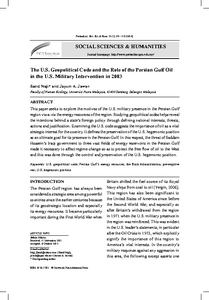Citation
Naji, Saeid and Jawan, Jayum
(2014)
The U.S. geopolitical code and the role of the Persian Gulf oil in the U.S. military intervention in 2003.
Pertanika Journal of Social Sciences & Humanities, 22 (1).
pp. 95-118.
ISSN 0128-7702; ESSN: 2231-8534
Abstract
This paper seeks to explore the motives of the U.S. military presence in the Persian Gulf region vis-a-vis the energy resources of the region. Studying geopolitical codes helps reveal the intentions behind a state’s foreign policy through defining national interests, threats, actions and justification. Examining the U.S. code suggests the importance of oil as a vital strategic interest for the country. It defines the preservation of the U.S. hegemonic position as an ultimate goal for its presence in the Persian Gulf. In this respect, the threat of Saddam Hussein’s Iraqi government to three vast fields of energy reservoirs in the Persian Gulf made it necessary to affect regime change so as to protect the free flow of oil to the West and this was done through the control and preservation of the U.S. hegemonic position.
Download File
![[img]](http://psasir.upm.edu.my/41643/1.hassmallThumbnailVersion/The%20U.S.%20geopolitical%20code%20and%20the%20role%20of%20the%20persian%20gulf%20oil%20in%20the%20U.S.%20military%20intervention%20in%202003.pdf)  Preview |
|
PDF
The U.S. geopolitical code and the role of the persian gulf oil in the U.S. military intervention in 2003.pdf
Download (412kB)
| Preview
|
|
Additional Metadata
Actions (login required)
 |
View Item |

